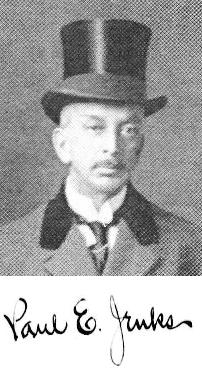Paul Jenks attended Brooklyn Polytechnic Institute and the Hopkins Grammar School of New Haven. He was an athletic youth and a proficient baseball player. At Yale he was a member of Kappa Sigma Epsilon, Psi Upsilon and Skull and Bones. He played on the freshman baseball and football teams, was winner of his class championship in lawn tennis, won third declamation prize in sophomore year, and was Yale reporter for the New Haven Register.
After graduation he went to Waterbury and worked for the Scovill Manufacturing Company, manufacturers of brass, for two years. He then took a position in the Citizens Bank of Waterbury, where he remained for three years. From 1888 to 1892, he held a position in the city treasurer's office in Brooklyn from which he was, as he put it, "asked to resign because the reform treasurer wanted to put two men in my place so as to strengthen his political life in two doubtful districts." Jenks intimated that the final fate of the reform treasurer was not preferable to his own.
After leaving the city treasurer's office, he engaged in business in New York. In 1896 he embarked on a bicycling tour through Europe (an experience that resulted in a series of magazine articles), and then moved to Japan to represent the J. B. Millet Company of Boston. He decided to remain in Japan, first as a commission merchant, later in the publishing office of the London Times as secretary in charge of correspondence. Jenks wrote that: "I have not made Rockefeller unduly jealous, but I own some Japanese houses and sign rent receipts every month.. . . and when an old class- or a young classman from Yale appears, I give him the grip, and try to forget the dampness of old South Middle walls during freshman rains."
Having acquired an excellent knowledge of Japanese and the economic conditions in Japan, he ultimately took a position as clerk at the U.S. Consulate General in Yokohama. He was appointed to the position of Vice-Consul on September 11, 1916, and continued to work as a consular official in Yokohama until his death on September 1, 1923. Paul E. Jenks died in the collapse of the Consulate during the Great Kanto Earthquake.
Paul Jenks attended Brooklyn Polytechnic Institute and the Hopkins Grammar School of New Haven. He was an athletic youth and a proficient baseball player. At Yale he was a member of Kappa Sigma Epsilon, Psi Upsilon and Skull and Bones. He played on the freshman baseball and football teams, was winner of his class championship in lawn tennis, won third declamation prize in sophomore year, and was Yale reporter for the New Haven Register.
After graduation he went to Waterbury and worked for the Scovill Manufacturing Company, manufacturers of brass, for two years. He then took a position in the Citizens Bank of Waterbury, where he remained for three years. From 1888 to 1892, he held a position in the city treasurer's office in Brooklyn from which he was, as he put it, "asked to resign because the reform treasurer wanted to put two men in my place so as to strengthen his political life in two doubtful districts." Jenks intimated that the final fate of the reform treasurer was not preferable to his own.
After leaving the city treasurer's office, he engaged in business in New York. In 1896 he embarked on a bicycling tour through Europe (an experience that resulted in a series of magazine articles), and then moved to Japan to represent the J. B. Millet Company of Boston. He decided to remain in Japan, first as a commission merchant, later in the publishing office of the London Times as secretary in charge of correspondence. Jenks wrote that: "I have not made Rockefeller unduly jealous, but I own some Japanese houses and sign rent receipts every month.. . . and when an old class- or a young classman from Yale appears, I give him the grip, and try to forget the dampness of old South Middle walls during freshman rains."
Having acquired an excellent knowledge of Japanese and the economic conditions in Japan, he ultimately took a position as clerk at the U.S. Consulate General in Yokohama. He was appointed to the position of Vice-Consul on September 11, 1916, and continued to work as a consular official in Yokohama until his death on September 1, 1923. Paul E. Jenks died in the collapse of the Consulate during the Great Kanto Earthquake.
Sponsored by Ancestry
Advertisement
Advertisement


